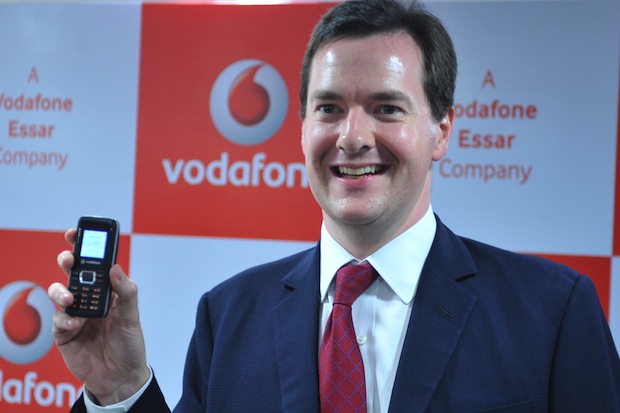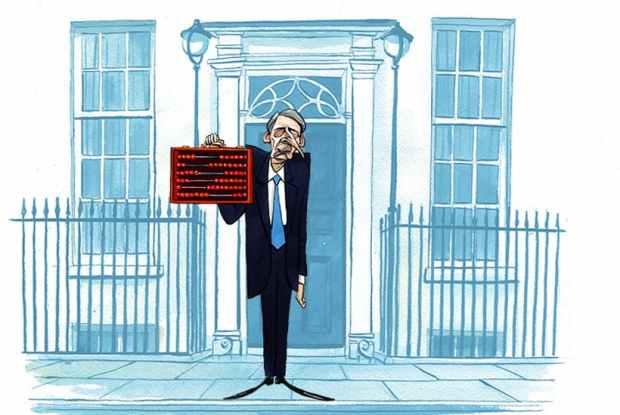James Forsyth and Isabel Hardman discuss George Osborne’s 2013 Autumn statement:
[audioboo url=”https://audioboo.fm/boos/1763353-isabel-hardman-and-james-forsyth-discuss-george-osborne-s-autumn-statement”][/audioboo]
Next week’s autumn statement looks at first as if it should be easy for George Osborne. For the first time, he’ll arrive with unambiguously good news. He can announce an upgrade of the growth forecasts and that borrowing has come in lower than expected. Politically, however, his task is as difficult as ever. He has to wrestle back the initiative from Labour.
Preparations for this ‘fiscal event’, to use the Whitehall parlance, have been intense. The government’s top Tories met last Friday to discuss how they wanted to project both David Cameron’s trip to China, which they hope will dominate the headlines in the days beforehand, and the autumn statement. They are acutely aware that this is their best chance to halt the momentum that Ed Miliband has had since his pledge to freeze energy prices.
Lessons have been learnt from the spectacular unravelling of the budget last year. Osborne will stay at home while Cameron goes to China. His presence alongside the Prime Minister in Washington last year was one of the many reasons that the 2012 budget turned into such a disaster. Indeed, the bar on travel to China extends even to those ministerial allies whose help Osborne might have to call on.
Osborne is a more mature politician than he was then. He has strengthened the ministers and advisers around him and improved his media performances, his weakest suit. But he still has a weakness for the trappings of power. He couldn’t resist an invitation to the PR guru Matthew Freud’s 50th birthday party, for instance. Once there, he pulled out his phone to record a duet between Bono and Bob Geldof — an act of gaucheness that has been the subject of much mockery in the Cameron circle.
The Tories, though, need Osborne to be on top of his game at the despatch box next week. The surge in support for Ukip coincided with that 2012 budget. Tory strategists are convinced that much of this switching was down to the impression that the government did not know what it was doing. With the economy now growing again, Osborne has a chance to persuade these voters that the government is competent and does have a long-term plan.
The return to growth is obviously welcome news for the coalition and the Tories, but it does pose a strategic dilemma. If they boast that the economy is fixed, the public might well decide that, now the danger has passed, it is safe to turn back to Labour.
Osborne has tried to walk the tightrope: celebrating growth while insisting the crisis is not over. Welcoming the latest positive GDP figures, he commented that ‘the hard work is paying off’ but tempered that soundbite by stressing the number of dangers that remain. But some senior Tories think that he has gone too far towards declaring victory. One influential figure says: ‘The problem is George is so desperate to get one over on Ed Balls that he wants to bank the recovery.’
Another way that this dilemma expresses itself is whether the autumn statement should contain any tax cuts for voters or other ‘sweeteners’. If it does, it could foster the sense that the economy has returned to normal. But if it doesn’t, Osborne could be accused of doing nothing to help those who are still feeling the squeeze.
The most likely sweetener is a cut in fuel duty, which Osborne has already committed to freezing for the rest of this parliament. Those close to Osborne point to the fact that petrol prices are likely to fall over the next year and say it would be worth claiming credit for that. Set against this is that Osborne feels that he received scant political reward for his 2011 cut in fuel duty. His team grumbles that they got far more mileage out of this year’s much cheaper beer duty cut. So, if Osborne does cut fuel duty, it’ll probably be accompanied by a mechanism to try to make sure the saving is passed on at the pump.
One thing we know that the autumn statement will contain is the government’s response to Miliband’s energy price freeze. Since the Labour leader announced this policy at conference, the coalition has been scrambling for a response.
Osborne’s instinct has been to cut back the various green levies that are currently pushing up bills. As Chancellor, he has become increasingly sceptical of the green agenda, and the chance to trump Miliband’s freeze with a bill cut is seductive to Osborne the political strategist. But the presence of the Liberal Democrats in government makes this impossible. So instead several of these levies will be taken off bills but then paid for out of general taxation.
This wheeze should ensure that household energy bills do not go up next autumn, removing some potency from Miliband’s pledge. And the Treasury calculates that it needn’t cost too much, because the government can deliver these schemes far more efficiently than the energy companies can.
There will also, I understand, be an indication that Osborne will slow the rise of the carbon price floor in next year’s budget. His confidants argue that unless he does this, whole industries such as paper and chemicals will end up leaving the UK.
It seems unlikely, though, that Osborne will enter a bidding war with Labour over the cost of living. Cameron has warned Tory MPs that the party will lose if it tries to match Labour pledge for pledge on the issue. The party’s electoral strategist, Lynton Crosby, has told the political cabinet that his polling shows that energy bills are not as big an issue as the Westminster village thinks. Instead, the Tory strategy is to emphasise that Cameron has a long-term plan to make Britain more competitive and help families get on in life. This will be contrasted with Labour’s opportunism.
At the start of this autumn, the Tories imagined that as the economy recovered they would reduce Labour’s lead in the polls. That hasn’t happened. Instead, Labour’s advantage has solidified even as the economy has grown. The challenge for Osborne is to use the autumn statement to persuade the voters that the Tories are the grown-ups of British politics; the party that they can trust with the economy.
Got something to add? Join the discussion and comment below.
Get 10 issues for just $10
Subscribe to The Spectator Australia today for the next 10 magazine issues, plus full online access, for just $10.
You might disagree with half of it, but you’ll enjoy reading all of it. Try your first month for free, then just $2 a week for the remainder of your first year.















Comments
Don't miss out
Join the conversation with other Spectator Australia readers. Subscribe to leave a comment.
SUBSCRIBEAlready a subscriber? Log in